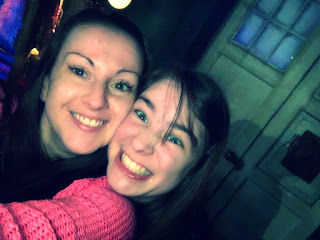Vulnerable people are not invisible!
It's been my intention for a long time to have these blog posts running in tandem with the column I write on a monthly basis for our local newspaper, The Colne Times. We've had a lot of things to deal with and learn about, and a lot of changes have had to be made and so I felt that now was the right time to get back on track in terms of raising awareness of childhood strokes, acquired brain injury and working towards much improved treatment and support.
In May, I wrote:
A
certain subject has arisen this month through running Pendle Stroke Group which
I wanted to talk about as it’s playing on my mind. Obviously I campaign for
there to be more awareness of childhood strokes, but my work in this area
naturally puts me in touch with a lot of elderly members of our community who
have experienced stroke, or whose family members have experienced stroke. A
common theme which is coming up is that our elderly neighbours are being left
for long periods of time, often weeks on end with no contact. None. Just think
about that for a moment. I know we’re all guilty of wanting some peace and
quiet but just really think about being in your house, unable to get out and
about at will and not seeing or speaking to anyone for weeks. Now imagine
that’s your grandparents, your parents, your aunts and uncles, is that really
how the people who have had an input in our lives should be treated when they
need us most? No matter what family history you have, no matter if you have no
family nearby, you will have elderly neighbours and you DO have time spare to
check on them, ask if they need anything picking up from the shops, go and have
a cup of tea with them. We are all going to be in this position one day so
please think.
Through taking over the running of our local stroke support group with my best friend, Lindsay, I've become much more aware of how stroke can affect a much wider range of people. We decided that as a natural progression to seeing our lovely members once every two weeks at our meetings, we would start home visits in between sessions and see if we could offer any more support. On our first visit, our group hadn't run for four weeks due to holidays etc. so we spent some time with our eldest group member who is 93. This lady was a volunteer at our group for years and years before having a stroke herself. She has lived in our village all of her life and has some absolutely amazing stories to tell. She's also a fantastic seamstress and spends a lot of her time embroidering pictures and crafting 'mug mats', one which takes pride of place on my coffee table. We had such a lovely time listening to stories of where she had worked, how she had met her husband, the life they had built together, her sadness at losing him, the holidays they took, the pets they had etc. We also learned that she wouldn't be able to attend any of the local war remembrance events which were due to take place in our village because of the walking frame that she had. She told us that when she bought her walker originally, she had toyed with the idea of buying one with a seat but had gone instead for a simpler version with no seat. It served its purpose well but one with a built in seat would allow her to do more. I knew without even looking at Lindsay that we had had exactly the same thought and that as soon as we had left this lady's house, we would be shopping for a shiny new walking frame with built in seat.
Now you'd think that after spending this time with a wonderful lady and doing a good deed, that we would leave our first home visit feeling all happy and at peace with the world ... Nope. "But why?" I hear you ask. Are we that difficult to please? Do we just not understand the beauty of these moments in life? No, we're not difficult to please and we adore those moments. Not only did we not leave full of the joys of spring, we left absolutely livid. Livid at the fact that we had discovered during our chat, that this important member of our community hadn't seen or spoken to another human being in the whole four weeks since our last stroke group meeting. Four weeks. 28 days without anybody to talk to. A 93 year old lady with a history of strokes and a heart condition and not one relative had popped in for a cup of tea, no community care professionals had called. Nothing.
I don't find this acceptable in the slightest and neither does Lindsay. We are huge advocates of looking out for each other and would love it if people could just stop for 5 minutes to ask if anybody needs anything or pop in on an elderly or vulnerable neighbour. This will come to us all eventually and if things carry on in this way, we're going to be a lonely society.

Comments
Post a Comment